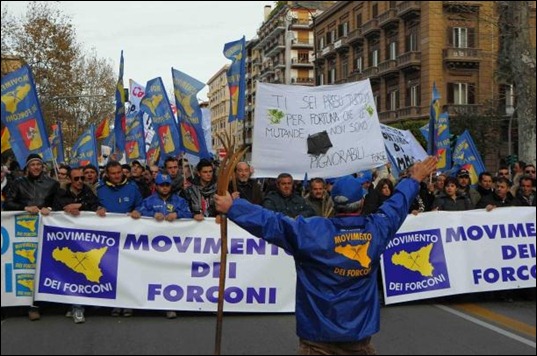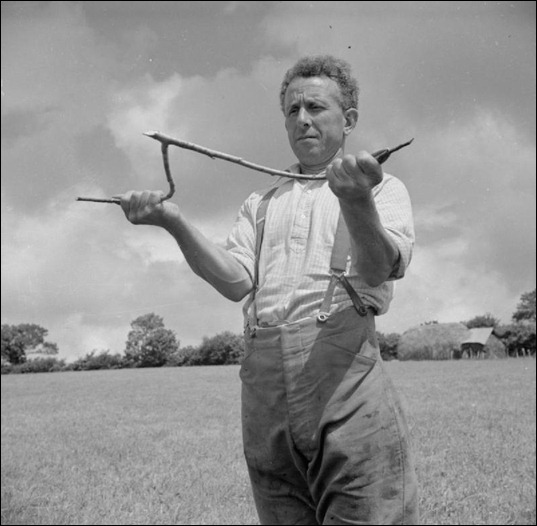Forks on Strike Posted by Serena on Dec 17, 2013 in Italian Language, News
For the past ten days Italian news has been dominated by lo sciopero dei Forconi (the strike of the Forks): the strikers blocked railway stations and motorways creating great difficulty for both public and goods transport, and protested in the main piazzas of several cities, throwing stones and paper bombs at administrative buildings and the Police who were there to protect them.
However, although I’ve been reading about it all on the internet I’m still not clear what the specific objective of their protest actually is, and it seems that most Italians are in the same situation. According to a poll carried out by TG3 (RAI 3 News), 80 per cent of the people interviewed didn’t have a clue what the strike was about, despite the fact that the Forconi claim to be representing the Italian people.
But why the name i Forconi? The strikers have taken their name from il forcone, the traditional three pronged fork used by farmers to move their hay. The name was supposedly chosen to demonstrate that they represent those who work for their own survival and are far removed from the power games of politicians and business people. Personally, all I’ve gained from this strike, apart from the minor discomfort of not being able to find our favourite brand of milk in the supermarket, and the late delivery of a parcel, is the inspiration to ask myself about the origins of the word forcone, and hence all the different words that derive from the same root. And that’s the topic of today’s blog: FORKS!
Let’s begin with the definition of forca, and take it from there:
la forca (fem. sing.) – 1. the fork/pitchfork, originally the two or three pronged wooden stick used by the farmers to move hay. 2. the gallows, e.g. mandare alla forca – send to the gallows
il forcone (masc. sing.) – the garden fork/pitchfork. (Literally, the big pitchfork) This can be either the modern day pitchfork made of metal with a wooden handle, or the fork used for digging the garden
la forchetta (fem. sing.) – the table fork. (Lit. the little fork) We use the expression essere una buona forchetta (to be a good fork) to describe a person who likes eating, e.g. Paolo è una buona forchetta! – Paolo really likes eating/likes his food!
la forchettina (fem. sing.) – the dessert fork, normally used for eating cakes, i.e. la forchettina da dolci. (Lit. the small little fork)
il forchettone (masc. sing.) – this can be either the carving fork used for holding the roast while cutting it, or the big wooden fork used for stirring the pasta. (Lit. the big little fork)
la forcella (fem. sing.) – the forked stick. Name common to many objects consisting of a main stick or bar which then divides in two parts, e.g. la forcella del rabdomante – the dowsing or divining rod; la forcella della bicicletta – the wheel fork of a bicycle which joins the handlebar to the front wheel. In geography la forcella is a very steep, narrow pass in between two high peaks which creates a V shape.
la forcina (fem. sing.) – the hairpin. (Lit. the small fork)
biforcarsi (reflexive verb) – to fork, to divide itself, e.g. quando la strada si biforca, tieni la destra – when the roads divides in two, stay on the right
la biforcazione (fem. sing.) – the forked junction. Point in which a road, railway, tree branch etc. divides in two
biforcato/a/i/e (past participle and adjective) – bifurcated, divided in two, e.g. il tubo che va al termosifone è biforcato, e porta acqua anche allo scaldabagno – the pipe going to the radiator divides in two and carries water to the hot water tank as well.
biforcuto/a/i/e (adjective) – bifurcate, e.g. il serpente ha la lingua biforcuta – the snake has a forked tongue, la capra ha il piede biforcuto – the goat has a two pointed hoof.

Build vocabulary, practice pronunciation, and more with Transparent Language Online. Available anytime, anywhere, on any device.






Leave a comment: